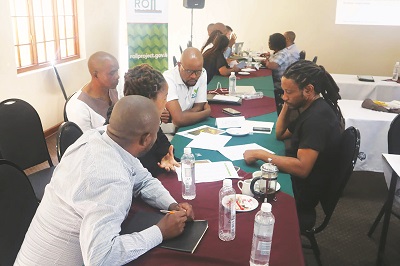The service providers made the event a 2 day workshop as they strategized means of implementation during the ROLL project. Nature4Water presents Nature Based Solutions (NbS) interventions and sub-catchments selections that the service providers involved in the project will utilize.
NbS refers to all actions for the protection, restoration and sustainable management of natural or modified ecosystems, which simultaneously provide benefits to human well-being and biodiversity, to respond to the most pressing socio-environmental challenges.
They will focus mostly on the improvement of landscape and the livelihoods. Lesotho ROLL will be activated in six districts for ROLL implementation, these are Botha-Bothe, Berea, Leribe, Thaba-tseka, Quthing, and Qacha’s Nek. The main areas of focus identified are agriculture, nutrition, rural business, environmental sustainability, and climate resilience.
Nature4Water will help design a fund for ROLL, in order to propel implementation and execution. It will also trace and identify to establish working relations with potential stakeholders and beneficiaries for the project. Sentebale and Avocado Vision will then provide training and education to communities about activities like avoiding soil erosion, improving livelihoods, environment, and natural resources.
Some of the interventions outlined are silvopasture which is the integrating of trees, forage, and livestock – grazing cattle in wooded areas, which gives the benefit of increased carbon sequestration and improved soil fertility. Wetlands restoration, which is the restoring of natural wetland ecosystems, such as reintroducing native plants and removing invasive species. This results in controlling floods, water filtration, and biodiversity conservation.
In conclusion of the meeting the targeted districts’ individuals made sub-catchments selections; identifying a variety of possible NbS interventions.
One of the sub catchments selected was sub-catchment number 35 which is Mashai in Thaba-tseka, where they identified their beneficiaries as villages such as Linotsing, Ha Setala and others in the form of schools and health care centres.
Food challenges faced by Mashai are soil erosion, land degradation, low agricultural productivity, malnutrition, burning of the pastures, and adaptation of hybrid seeds varieties. Livelihood challenges are poor health services, severe weather conditions, theft, unemployment, and lack of economic opportunities.
Water security challenges; lack of portable water, inadequate water supply infrastructure (vandalism), and improper facilities.
Possible NbS interventions; rotational grazing, brush control, farmer managed natural regeneration, and sustainable agriculture practices.
Thus far, identified possible funding beneficiaries include ROLL, Rand Water (RSA), ORASECOM, Irrigation schemes, and Ecotourism facilities along Senqu, while Stakeholders are headed by different Government of Lesotho (GoL) community associations, and SADP II.


